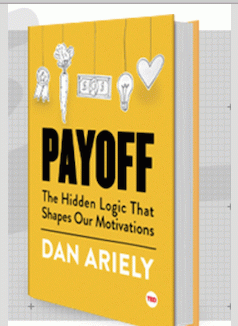JB: Can we switch gears totally for a moment, Dan? Your website has all kinds of interesting and unexpected finds. For instance, I discovered that you have developed flash cards, a board game and apps, among other things. Is this a departure from pure research?
DA: Is this a deviation from research? Absolutely. In the academic world, everything is not pure research and publishing is a deviation from research. Even writing books is a deviation. And of course something like a game would be a stronger deviation. But a couple of things to think about from my perspective: One is if we carry out research, even if it's the most amazing research in the world, and nobody knows about it, how valuable is it? So, when you do research on molecular biology and you have a small group of people who are potentially interested, maybe it's okay. But if you do research that has application for our regular daily life, I think it's a little bit irresponsible not to try to share it broadly and leave the knowledge only in the hands of the very few.
So, yes, it's a deviation from research, but I think it's in the service of the mission. Now, in terms of the card game specifically, the thought was the following: When you read a book, it's kind of a passive experience. And of course it's nice if from time to time, you stop and you think and you reflect and so on. But I was thinking, how do you get people to be even more actively involved? What would get people to have a discussion, a dialog, to think more carefully? And the card game was an idea to take a passive experience of reading, not as passive as TV but passive in general, and try to get people to have a discussion, a dialog, stopping, thinking, reflecting. So, each card is designed to get people to think about an experiment, to predict the results, to have a discussion, to think about the implications. And indeed, the feedback I get is that that is what people do. The challenge is lots of people tell me that they never finish the game, they just start discussions and they never finish the game but that's okay. I think that's actually a good outcome.

cover art for 'Payoff: The Hidden Logic That Shapes Our Motivations'
(Image by courtesy of Dan Ariely) Details DMCA
JB: Let's go back to your new book. Payoff is a TEDBook, which makes it different from your other books. I know about TED Talks, and have heard many, including several of yours, but TEDBooks is a new one for me. How and why did you deviate from your usual publishing pattern this time, other than the obvious, that this book is much shorter than your others?
DA: A TEDBook is actually different from regular books; It's a short book. TED had this idea of doing something that is between the real length of a book and a TED Talk, something in the middle. And I thought this is an interesting format to try an experiment with. And so I accepted the challenge. And I also took advantage of this new format to try something new. In particular, I have a couple of chapters that are kind of standard for me which are all about the experiments and data and what we find. And here's the experiment and here's what it is. But I took advantage of this to start the book with a much more general perspective about my own search, my own motivation. Talking about some difficult challenges I had and how do I use them to think about motivation and conflict, explore it for my own sake. Usually, when I have a book, I kind of mostly figure things out and I basically write. In this case, I was using the book to try to figure it out. And the introduction is really kind of my own exploration about this and so is the last chapter. So, I think it is a short format. I took more liberty with that and I also kind of became a bit more exploratory in my own sense of what works and what doesn't work and how we think about motivation.
JB: Well, I hope this conversation motivates people to read Payoff: The Hidden Logic That Shapes Our Motivations. It could really pay off with happier, more productive workplaces for all of us! Thanks so much for chatting with me again, Dan. Next time, if you're amenable, I'd love to talk about the documentary, (Dis)Honesty: The Truth About Lies based on your book, The (Honest) Truth about Dishonesty.
DA: Thank you, Joan.
(Note: You can view every article as one long page if you sign up as an Advocate Member, or higher).





